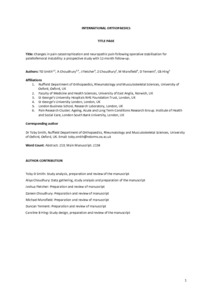Smith, TO; Choudhury, A; Fletcher, J; Choudhury, Z; Mansfield, M; Tennent, D; Hing, CB
(2021)
Changes in pain catastrophization and neuropathic pain following operative stabilisation for patellofemoral instability: a prospective study with twelve month follow-up.
Int Orthop, 45 (7).
pp. 1745-1750.
ISSN 1432-5195
https://doi.org/10.1007/s00264-021-05046-w
SGUL Authors: Hing, Caroline Blanca
![[img]](https://openaccess.sgul.ac.uk/113294/1.hassmallThumbnailVersion/PFIcatastrophizing_Manuscript_V2.3_29Mar2021_accepted%5B95%5D.pdf)  Preview |
|
PDF
Accepted Version
Available under License ["licenses_description_publisher" not defined].
Download (239kB)
| Preview
|
Abstract
PURPOSE: To determine the prevalence and change in neuropathic pain or pain catastrophizing before and 12 months following patellar stabilisation surgery for patellofemoral instability. METHODS: We conducted a prospective clinical audit within a UK NHS orthopaedic surgical centre. Data from 84 patients with patellofemoral instability requiring stabilisation were analysed. Fifty percent (42/84) underwent MPFL reconstruction alone, and 16% (13/84) had both trochleoplasty and MPFL reconstruction. Neuropathic pain was assessed using painDETECT score. Pain catastrophizing was assessed using the Pain Catastrophizing Score. The Norwich Patellar Instability (NPI) Score and Kujala Patellofemoral Disorder Score were also routinely collected pre-operatively and one year post-operatively. RESULTS: At 12 months post-operatively there was a statistically significant reduction in mean Pain Catastrophizing Scores (18.9-15.7; p < 0.02), but no change in mean painDETECT scores (7.3-7.8; p = 0.72). There was a statistically significant improvement in NPI scores (90.2-61.9; p < 0.01) and Kujala Patellofemoral Disorder Scores (48.7-58.1; p = 0.01). The prevalence of pain catastrophizing decreased from 31% pre-operatively to 24% post-operatively, whereas the prevalence of neuropathic pain remained consisted (10-11%). CONCLUSIONS: Neuropathic pain and catastrophizing symptoms are not commonly reported and did not significantly change following patellofemoral stabilisation surgery. Whilst low, for those affected, there remains a need to intervene to improve outcomes following PFI surgery.
| Item Type: |
Article
|
| Additional Information: |
This is a post-peer-review, pre-copyedit version of an article published in International Orthopaedics. The final authenticated version is available online at: http://dx.doi.org/10.1007/s00264-021-05046-w |
| Keywords: |
Neuropathic pain, Pain catastrophizing scale, Patellar dislocation, Patellofemoral instability, Psychological outcomes, Patellofemoral instability, Pain catastrophizing scale, Psychological outcomes, Neuropathic pain, Patellar dislocation, Neuropathic pain, Pain catastrophizing scale, Patellar dislocation, Patellofemoral instability, Psychological outcomes, 1103 Clinical Sciences, Orthopedics |
| SGUL Research Institute / Research Centre: |
Academic Structure > Molecular and Clinical Sciences Research Institute (MCS) |
| Journal or Publication Title: |
Int Orthop |
| ISSN: |
1432-5195 |
| Language: |
eng |
| Publisher License: |
Publisher's own licence |
| PubMed ID: |
33877405 |
| Web of Science ID: |
WOS:000641636400005 |
| Dates: |
| Date |
Event |
| 2021-07 |
Published |
| 2021-04-20 |
Published Online |
| 2021-04-12 |
Accepted |
|
 |
Go to PubMed abstract |
| URI: |
https://openaccess.sgul.ac.uk/id/eprint/113294 |
| Publisher's version: |
https://doi.org/10.1007/s00264-021-05046-w |
Statistics
Item downloaded times since 02 Jun 2021.
Actions (login required)
 |
Edit Item |



